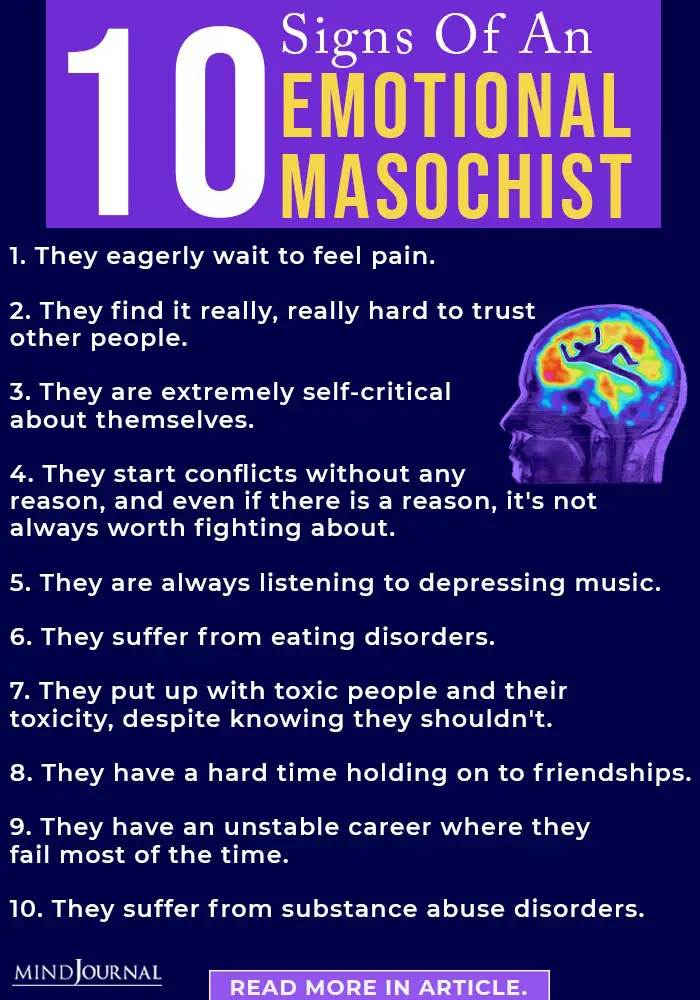Do you know someone who likes engaging in certain behaviors despite knowing they will hurt themselves or someone? These are signs of an emotional masochist.
Maybe somewhere deep, down inside, they like to hurt and abuse themselves, because the pain they feel gives them a certain kind of pleasure? If you answered yes to both these questions, then chances are you have met an emotional masochist.
Now keep in mind that emotional masochism is not the same as sexual sadomasochism, where one person is the dominating and controlling one, and the other person, the submissive one.
What is an emotional masochistic behavior?
Truthfully, from a psychological point of view, emotional masochism is basically indulging in self-defeated mannerisms and behaviors, which are committed by you to yourself. In simpler terms, emotional masochists love to cause pain and humiliation to themselves.
Here Are 10 Signs Of An Emotional Masochist

1. They Eagerly Wait To Feel Pain.
Everything might be well and perfect in their lives, and they might not have any reason to complain, but there is a part of them that is constantly thinking something bad is going to happen. They keep on ignoring or undermining the good and positive things in their life, and constantly obsess about the negative things, that ‘might’ end up happening.
Yes, bad things happen in life, but does that mean life is entirely bad? Of course not! The main principle about living is that you have to take the good with the bad, but when it comes to emotional masochists, they never think like that. They will keep on thinking and waiting for the pain to come, and if it really does, they feel, “Yes, I knew it”, and thrive in that pain and negativity.
Related: Self-Abuse: Are You In An Abusive Relationship with Yourself?
2. They Find It Really, Really Hard To Trust Other People.
They might have a painful past, where they were hurt and betrayed many times, or they might have just decided that they should not trust anyone. Ever. Nobody is deserving of their trust, and nobody should be trusted under any circumstances.
This thought process manifests as them insulting other people needlessly, brutally, and unfairly questioning everybody’s integrity (no matter how of good a person they might be), believing that everybody is out to get them, or simply just accusing someone to be untrustworthy to their face (even if they don’t have any reason to feel like that at all).
But deep down inside, they hate the fact that they are unable to trust anyone, but then they console themselves by believing that they are used to feeling like this, and it’s okay.
3. They Are Extremely Self-Critical About Themselves.
One of the biggest signs that someone is an emotional masochist is the excessive self-criticism they throw at themselves, sometimes for even the smallest of things. Whenever something bad happens, they are quick to judge themselves and constantly feel that it’s all their fault (even when it isn’t). They believe that everyone hates them, and nobody wants them in their lives and considers them to be a waste of space (which might not be true at all).
Their negative and self-deprecating thoughts get so bad sometimes that except for crying, they are unable to do anything else to release that emotional and mental pain.
4. They Start Conflicts Without Any Reason, And Even If There Is A Reason, It’s Not Always Worth Fighting About.
The occasional arguments and fights are okay and happen in every relationship. But when it comes to an emotional masochist, they just start fights without seemingly any reason, or even for the most harmless of reasons. And once the fight has started, they keep at it, without wanting to resolve it whatsoever, and it goes on and on and on.
They do this because they have so much emotional pain inside them, that constant fighting and arguing are the only things that help them let it all out; these things help them cope with all the emotional investment they have done for the relationship. They can fight about anything and everything.
Related: 30 Things to Stop Doing to Yourself
5. They Are Always Listening To Depressing Music.
They have an unhealthy attachment and attraction towards listening to depressing and sad music and listen to it all the time. Even though it’s not a bad thing to listen to sad music, but emotional masochists do this because they relate to the lyrics of the songs very much, and believe that the same things happen to them.
Another reason why they love listening to depressing music is that they inherently feel that these songs understand their feelings and understand how they see life. These songs might make them feel a bit better temporarily, but it ends up being more painful in the long run.
6. They Suffer From Eating Disorders.
If someone is an emotional masochist, then chances are they suffer from an eating disorder; either they starve themselves or they end up overeating and binge-eating. They might feel that only food will be able to fill the void inside them, or that they don’t deserve to eat and only deserve to suffer.
No matter what the reason is, it’s harmful to the body, mind, and soul. If you know someone who is struggling with an eating disorder, encourage them to seek therapy and try to overcome this.
7. They Put Up With Toxic People And Their Toxicity, Despite Knowing They Shouldn’t.
When someone is an emotional masochist who likes to cause pain to themselves, they have no trouble tolerating and accepting toxic people and their toxicity. They end up putting up with their negativity, abuse, controlling, and demeaning nature, no matter how much it hurts them. Emotional masochists let people treat them this way because, on a subconscious level, they feel that they deserve this kind of treatment.
So, they let them do whatever they want with them, and make no efforts to stop them. Toxic people keep on hurting them and abusing them because those people believe they have the right to do this.
Related: 8 Deep Questions To Ask Yourself If You Keep Attracting Toxic Partners
8. They Have A Hard Time Holding On To Friendships.
The smallest of arguments cause them to end friendships, even the ones that have been in their lives for several years. Because they are so used to emotional pain, they find ways to hurt themselves and victimize themselves, so that they have a reason to break off their friendship with someone. This affects them badly, but they just can’t help it, no matter how hard they try.
They indulge in this kind of self defeating behavior, because they constantly need something to feel guilty about and hate themselves; it’s like a vicious cycle. They make friends, make beautiful memories with them, and then something happens and the friendship is over for good.
9. They Have An Unstable Career Where They Fail Most Of The Time.
They might have the perfect job or even their dream job, but unfortunately, they will do something or the other to sabotage it and make things difficult for themselves. This keeps on happening with every job they get, and after a point, they run the risk of destroying their whole career and future.
They might go to work every day, but not do any work at all. They will deliberately not listen to the advice of their superiors, and always try to do things their way, which ends up creating further problems. They fail to get along with their colleagues. They fail to meet targets and struggle to do what is expected of them. In other words, their emotional masochism pushes them to emotionally destroy their own career.
10. They Suffer From Substance Abuse Disorders.
Being an emotional masochist, it should not come across as a surprise that gradually with time, they develop substance abuse disorders (alcohol, drugs). They might be heavily dependent on alcohol, or on drugs, or worst-case scenario, both. They do this because they try to numb their emotional pain with all this; it makes them feel better, but only temporarily.
They drown their hurt, sadness, depression, and pain in drugs and alcohol because they don’t know how to do it in a healthy way. And they don’t try to stop themselves from indulging in all this, because dealing with their difficult feelings in a normal way is something they just don’t know how to do. So this continues on and on and on.
Related: Why Do We Struggle to Heal Emotional Wounds?
Being an emotional masochist is an extremely difficult thing to deal with, and it can sometimes feel impossible too. However, the good news is that someone who suffers from this, can get the necessary help to deal with this, and work on this. Nobody in this world is perfect, and nor does anyone have to be perfect.
All you have to do is work on yourself, try to be happy, have a normal, emotionally and physically healthy, and fulfilling life.











Leave a Reply
You must be logged in to post a comment.